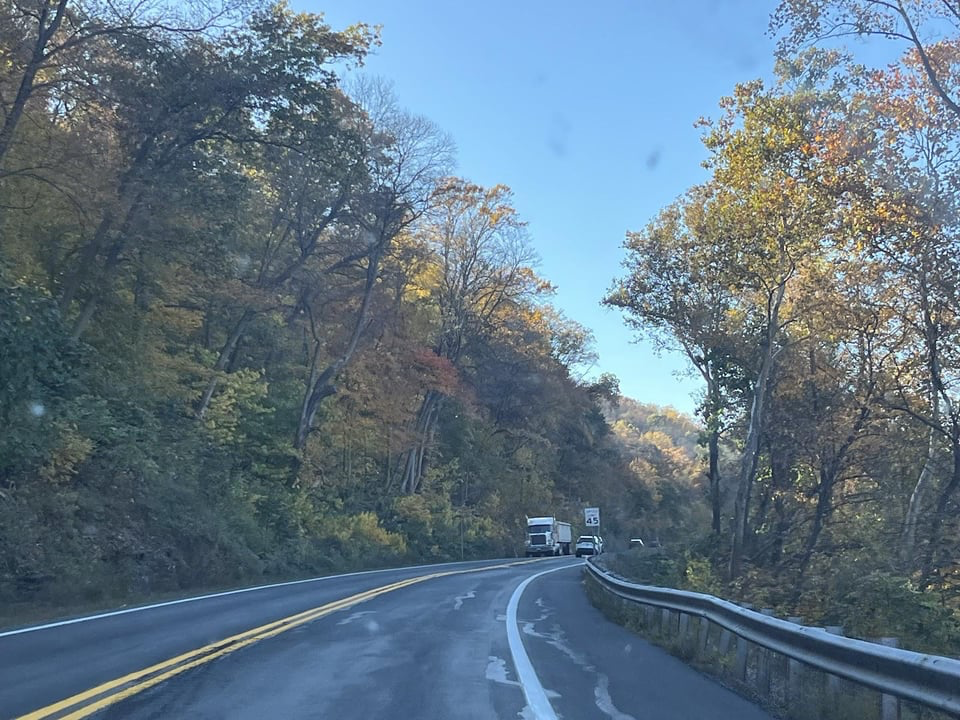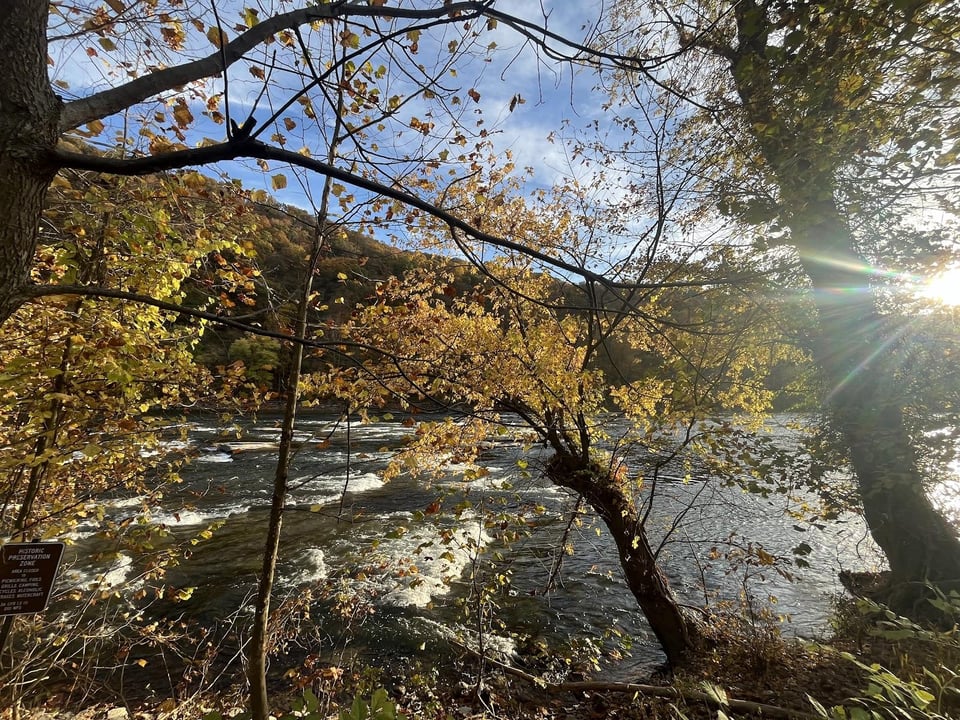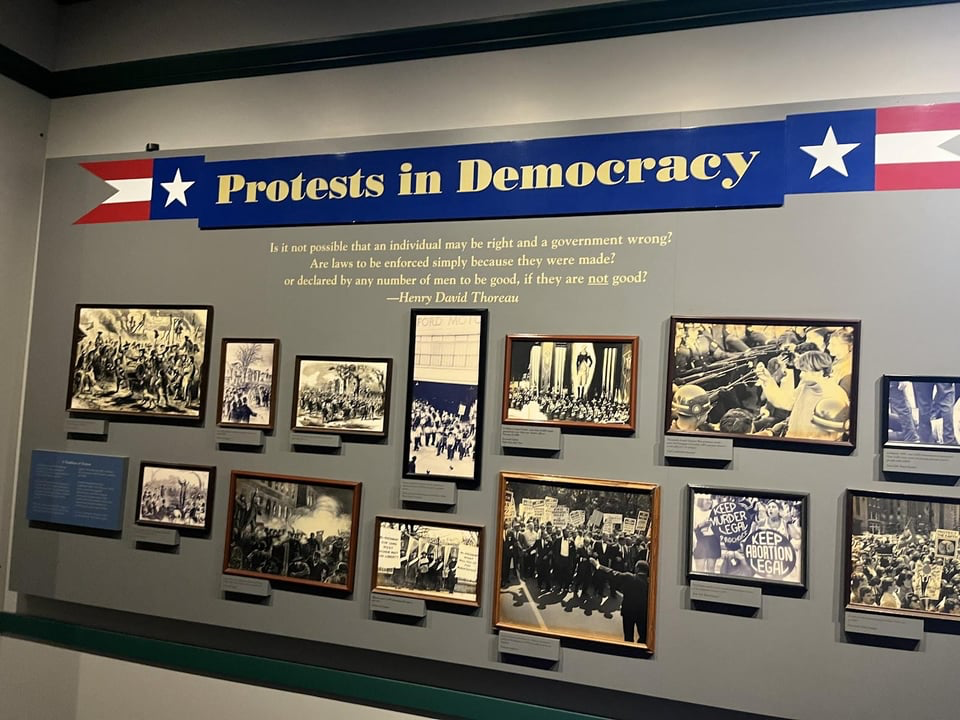John Brown's Body
A few weeks before the election, in the middle of a hot, bright autumn that never seemed to end, I took a trip to Harper’s Ferry, West Virginia.

The entire East Coast was deep in drought, and the landscape soughing by the car windows felt parched. At Harper’s Ferry, an awesomely beautiful national park at the intersection of the Shenandoah and Potomac rivers, that bright, hot dryness attained a kind of magnificence. The Appalachians swelled soft and high around us in a leafy riot, some boughs still full of unturned green, the hills a patchwork of flaming colors.

We were there to pay our respects to John Brown, the man whose 1859 raid on the arsenal at Harper’s Ferry was both a doomed and fanatical salvo in his own war on the institution of slavery, and one of the precipitating incidents of the broader war that would finally, in blood and fire, cause the end of that “peculiar institution” in this country.
It was so, so beautiful. The rivers, each blue-gold. The leaves gold too. The white and silent obelisk paying tribute to Brown, and the now-empty arsenal he’d died for, alongside his sons, and sixteen more. The Blue Ridge mountains precipitate and lovely in their height, old and awesome and indifferent.

I knew we were, as a nation, standing on a precipice; the tribute to Brown was an acknowledgement of that, a sense that, despite the small cushion of hope I still clung to, there was a strong possibility that rage and zeal spent in fruitless struggle might again be needed, that the forces of reaction were marshaling all around us. In his final note, slipped to his jailor before his last dance at the gallows, Brown wrote, “I, John Brown, am now quite certain that the crimes of this guilty land will never be purged away, but with blood.” Now, after the election, in a winter of discontent—those sun-bright days gone, and that wisp of hope with it—I think back on that brief interval on the banks of the Shenandoah with half bitterness, half wistfulness.
The Sword and the Sandwich is a newsletter about deadly serious extremism and serious sandwiches. Please consider supporting this work with
a paid subscription.
I’ve spent the past ten years gazing into the abyss of America’s darkest communities—from neo-Nazi fight clubs to Christian child-abuse manuals—and had hoped, among myriad less selfish hopes, for a reprieve. I remember the daily sordid ugliness of Trump’s first term, and know this one will be worse—whatever guardrails there were long rusted, another half-decade of apathy and despair accrued—and tried to take a little piece of time to build a little piece of strength, because the words didn’t want to come, because I felt burnt-out and hollow as the land.
Now the days are cold, and the daily accumulation of corruption has sped up. Last week a less zealous if not more cunning folk hero has made another doomed stand against another American institution drenched in blood—a young gunman who shot down an executive of America’s health insurance industry, which, while it has the benefit of not actually being chattel slavery, deals similarly in profit and blood. Like other American outlaws, the gunman inspired a few murder ballads, a frisson of adulation. This is a country that likes its lawmen, and likes its outlaw killers, too.

Compared to the raid on Harpers Ferry, this incident seems unlikely to kick off an overdue war—the class war, which is only recognized as violence when waged by labor against capital; the everyday slow murder by prior authorization and wage theft waged by the latter against the former is viewed as the natural and civil order of things. The incoming cabinet is distinguished not just for its odiousness, but for its singular wealth: a murderer’s row of billionaires, selected to loot what remains in the public’s coffers. And John Brown’s body has for too long lain a-mouldering in his grave, with no one to replace him.
Still: the rains came back to New York. They came back, and the fires went out, and soon the sun will start returning—in only a week the days get longer. They always do. I spent some time with my own despair, and have elected, for the most part, not to indulge it. If I am not the same person I was during Trump’s first term, some of that lost enthusiasm has been tempered by rough-won knowledge. By the examples of history, and the tumult of the present—a dictator toppled in Syria, and martial law revoked in South Korea on the back of popular revolt, and Ukraine persists in its long and lonely war against invasion.

This summer salmon spawned in the Klamath River for the first time in a century, after Indigenous activists worked for decades to remove dams. Very little is inevitable, besides the sun’s return and the rush of the Shenandoah down to the Potomac into Chesapeake Bay, into whose broad wide mouth you can wade and walk in salt for a long way.
There’s been so much talk about not complying in advance, about training your own mind to rebel against injustice. Some of that rebellion is innate in this soil, which has bred rebels and outlaws for so long. Some of it is inside us, in the joyous chaos of our oddities, our undisciplined loves and bodies, our ideals and faiths that the dour worship of Christ and capital would gladly disallow. In that raucous chorus, in the sound of returning rain, in the sound of the Shenandoah hurling itself against the green banks, comes strength returning. And possibility, and the end of drought.

-
Well stated, I visited that lovely area in late 2020, with my wife and son. It was a much different time than this. But everything you write here i felt, just less eloquently. Thank you for a wonderful quick read. I've steeled myself to dive back into your most recent book. Excellent work, but only in small doses for my sanity.
-
Grateful for your words and insights!
-
Talia please know your voice needs to be heard now more than ever.
-
My god, that was beautiful. I’m in.
-
Completely what I needed to hear
-
This is so beautiful. And hopeful. Angry as I am at this country right now, we have, for better and for worse, always been pretty good at telling authorities to fuck off. We were founded on it, we've persisted in it, and maybe we can carry on in that grand old tradition now
-
Love your writing. Beautifully executed, and right on target.💙
-
I’m fortunate to have been born and live in New Zealand, where we have had state-supported medical care since our first Labour government in 1938. That’s about a decade longer than the much-praised British National Health System. Our health system has literally saved my life twice (burst appendix, coronary bypass surgery) without imposing any noticeable financial burden on me, and I’m deeply, seriously grateful.
In the legendary tales of Jesus Christ, there are several accounts of him performing healing wonders – making the lame walk, the blind see, even restoring life to the dead. But there’s no suggestion that he required payment for these miracles. How can purportedly Christian Americans fail to provide similar comprehensive medical support to their fellow men, women and children without betraying their principles? It’s a mystery, to which the only plausible solution is profoundly sordid.
-
Quite possibly one of your best. This spoke not just to me but for me. In the past several election cycles of elation and despair we have hope and in hope strength. Do take care. Tootles... Wade
-
You write beautifully Talia, sending you good wishes from Australia.
-
That is a beautiful piece of writing! Thank you!
-
Beautifully written with deep insights. The writing craft doesn’t get any better. Superb job. Now let’s go resist the bad guys and continue the struggle for a better world.
Add a comment: